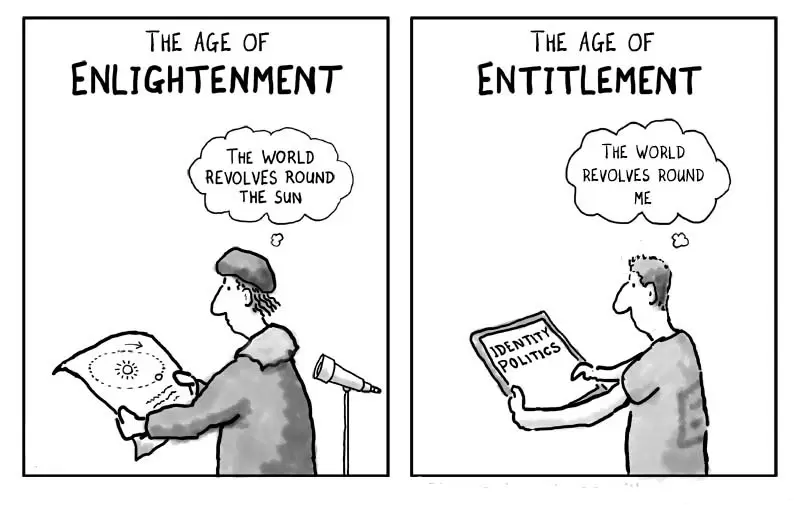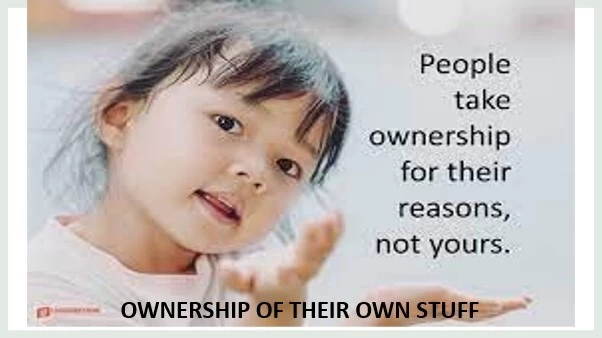Entitlement is where children believe they should have anything they want, while also believing they shouldn’t have to make any effort to get it. Remarkably, parents, who are responsible for creating these children, are typically unaware it is their actions that have caused this.

Most parents try to give responsibility by saying something like this to their child: “I’m giving you responsibility! So now you’ve got to start taking care of all your own stuff!” But then nothing happens, absolutely nothing changes! WHY NOT? The problem is revealed in one little word of what we say to our kids: “. . . start taking care of your own stuff.” The problem is it is only when children perceive ownership that they can begin to feel responsibility. But we do not feel real ownership of things unless we have paid or sacrificed something to obtain them.
Ownership is the lever that can spring kids out of the entitlement trap and motivate them to work for and earn what they want, to take care of things, to fight through difficulty, to face up to their own problems, and to decide for themselves what they want from life.

Entitlement arises from well meaning parents , who often weaken their children by overindulging them and overmanaging their lives. Moreover, when these parents give their children too much, it often prevents those children from recognizing their true aspirations. It takes away their opportunity for discovery and the self-pride and contentment that follows adversity and struggle.
THE SOLUTION
CHOSEN AND EARNED OWNERSHIP CAN BE THE ANTIDOTE TO ENTITLEMENT, THE PREREQUISITE TO RESPONSIBILITY, AND THE INCENTIVE FOR WORK
RESULTS FOR YOUR KIDS | a safe and clearly marked path from dependent childhood to responsible adulthood.
AND FOR YOU | a whole new model and paradigm for your parenting.
THE QUICK FIX
GRATITUDE
Entitlement is essentially ingratitude, and gratitude is thus its antidote. Where entitlement says, “I’m owed that,” gratitude says, “The world doesn’t owe me anything.” Where entitlement says, “I deserve this,” gratitude says, “Everything I get is a gift.”
Quality time/AKA one On one time is the single most important tool in the Un-Entitler Toolbox, This tool entitles children to their primary emotional needs—belonging and significance. It also prevents attention- and power-seeking behaviors like whining, acting helpless, throwing tantrums, fighting with siblings, staging bedtime battles and more.
PLEASE AND THANK YOU

A FURTHER 8 TIPS ON PARENTING TO AVOID ENTITLED BEHAVIOUR
1. Don’t Reward Bad Behaviour
This is easier said than done, but don’t let your teen get their own way after they have misbehaved, being disrespectful, or failed to meet an expectation. Every time you give in to your teen out of sympathy or to avoid the angry outburst you are rewarding them and encouraging to do more of the same next time.
2. Don’t Empower An Inappropriate Attitude
Whenever you react to your teenager’s inappropriate manner or defiant language in a manner that suggests you have been upset or wounded you are empowering them in both their belief and their behaviour. All misbehaviour has a goal, and a common goal for teenage is misbehaviour is to hurt, anger, or get a rise out of their parents. When you take the bait and join in the argument or let them see you are hurt, you both confirm their belief about their power over you and embolden them to do more of the same in the future.
3. Don’t Rescue Your Teenager
If your teenager makes a mistake or is let down by life, give them the chance to deal with it – don’t step in and do it for them. It is hard as a parent to see our kids hurting or upset. When we step in as parents we are being selfish, tending to our own short term discomfort at the expense of our teenager’s long term well-being.
4. Don’t Confuse Necessities With Privileges
be very clear on what your teenager really needs and what you give them that is actually a privilege. Privileges can be taken away or not given, needs really should be provided. You have to know the difference and not get confused by your teenager’s sense of what they think they need. Just because every other kid at school is allowed to do something, it doesn’t mean it is a right or necessity for your teen. Don’t get guilted into thinking you are inhumane for taking a smartphone off your teen. Remember also things like being driven to and from events, pocket money, and being trusted are all privileges that your teenager can forfeit if they fail to demonstrate they value such privileges.
5. Do Set And Enforce Boundaries
The way you help your teen know and operate within acceptable limits is to set and enforce boundaries. I have written about this in previously but the key points to having boundaries with teenagers include:
- Set the boundary in advance
- It needs to be clear to both you and your teenager
- Consequence for breaching a boundary needs to be stated upfront
- Consequences need to be enforced – parents must follow through, overtime
It can be easy to get focused on only responding to the negative – especially when every day feels like a battle. But one of the most effective ways to stop the cycle of entitlement is to note the times your teen contributes, takes responsibility, or deals with a problem constructively and offer them encouragement.Encouragement should be specific and meaningful. Your teen needs to understand exactly what it is they have done that was positive.
7. Do Offer Opportunity
Give your teenager age-appropriate responsibilities as part of family life – this should not be an option. Also if your teenager wants something extra, i.e. a new piece of technology or money for a trip away, then work out a way for them to help find the funds to get it done. Give them more jobs around the home (if you can afford it) or help them find a part-time job if they are old enough. Another key time to give your teen opportunity is when they lose a privilege, i.e. banned from Xbox, allowance docked, or their curfew is reduced. When this happens explains to your teen how they could speed up the process of having the privilege restored or how they could make amends for what they have done. Giving consequences without offering the opportunity to demonstrate learning and the ability to change, can be discouraging and build resentment
8. Do Be Consistent
If there are 2 of you parenting your teenagers then you need to be aligned and agreed on what approach to parenting your teen is and isn’t okay. (If you are a single parent, consistently of approach is one of the few things that is easier.) If only one parent is going to set and enforce the limits and offer encouragement then your teen will spot the inconsistency and follow the path of least resistance. In the meantime, they will see an opportunity to increase their power in the relationship by dividing parents against each other. Therefore it is important that if there are 2 parents, both commit to establishing a regime of how to manage and parent your teenager. This might well take some negotiation and compromise on the “how” getting things done, but it is a worthwhile process to go through.